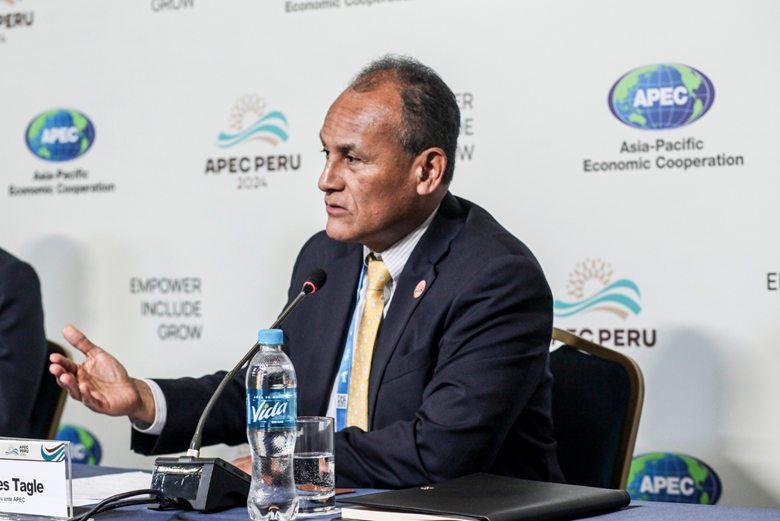How Increasing Trade Access for Indigenous Businesses Enriches Markets and Promotes Sustainability

Digital tools offer a gateway for Indigenous businesses to global markets that were previously inaccessible.
Increasing access to the benefits of trade for Indigenous business and entrepreneurs is not merely about economic growth or commercial opportunities. It is about ensuring that the benefits generated by trade are inclusive, sustainable and deeply rooted in traditional knowledge and cultural expressions that Indigenous peoples have practiced for millennia.
APEC member economies are home to a rich tapestry of Indigenous cultures, each with its own unique heritage, knowledge systems, and approached to sustainable living. As the global economy becomes increasingly interconnected, it is imperative that we create pathways for Indigenous businesses and entrepreneurs to participate fully of the opportunities that trade offers. By doing so, we not only contribute to their economic empowerment but also enrich the global marketplace with the values, perspectives and innovations that Indigenous peoples bring to our economies.
In this context, increasing access to trade for Indigenous business and entrepreneurs is crucial for several reasons. Trade offers a powerful means of achieving economic empowerment, allowing Indigenous peoples to leverage their resources, knowledge and skills allowing them to operate in sectors such as tourism, agriculture, creative industries, among others, where they bring unique products and services that reflect their cultural heritage and sustainable practices.
Sustainable economic growth is a key priority for APEC, and Indigenous businesses have a key role to play in achieving this goal. Unlike conventional business models that often prioritize short-term profits, Indigenous enterprises are typically grounded in values of sustainability, stewardship and long-term community well-being. These values are essential for creating an economy that not only generates wealth but also preserves nature and supports social cohesion.
For instance, in Peru, Indigenous Peoples in the Amazon and Andes regions are at the forefront of efforts to conserve forests, protect biodiversity, and promote sustainable agriculture. By promoting Indigenous participation in trade, we can amplify these sustainable business models and encourage broader adoption of practices that protect biodiversity, reduce carbon emissions and promote the sustainable use of natural resources. In this sense, trade can be a powerful tool for reinforcing the connection between economic growth and environmental responsibility.
It is important to highlight that one of the most promising developments in recent years is the rise of digital tools and technologies that can help Indigenous entrepreneurs access export markets and compere on a global scale. For Indigenous businesses, digital tools offer a gateway to global markets that were previously inaccessible. E-commerce platforms, social media and digital marketing enable Indigenous entrepreneurs to showcase their products and services to an international audience, connecting directly with consumers who value cultural heritage and sustainability. For instance, a Peruvian cooperative can market their sustainably harvested coffee to consumers in North America – all with the click of a button.
Moreover, digital tools can help Indigenous businesses overcome some of the logistical challenges related with international trade. Online payments systems, digital supply chain management, and virtual trade shows allow businesses to manage their operations more efficiently and connect with buyers and suppliers across borders.
To fully realize the potential of digital trade for Indigenous businesses, it is fundamental to invest in digital literacy and infrastructure. Many Indigenous communities, particularly in remote areas, still face significant barriers to accessing digital technologies, including limited internet connectivity and a lack of digital skills. Public and private sector must work together to address these gaps, ensuring that Indigenous entrepreneurs have the tools and knowledge they need to succeed in the digital economy.
APEC economies, with its rich diversity of Indigenous peoples has a unique opportunity to lead the way in creating an inclusive and vibrant trade ecosystem that benefit all. To achieve this, it is important to invest in digital tools and infrastructure to connect Indigenous businesses to global markets, promoting the trade of services that leverage Indigenous knowledge and expertise, and ensuring that trade policies support sustainable development.
I am confident that, as we move forward, we will envision a future where Indigenous businesses and entrepreneurs are included in the global economy, as well as at the forefront of innovation, sustainability, and inclusive growth.
***
Renato Reyes is Peru’s Senior Official for Asia-Pacific Economic Cooperation.

